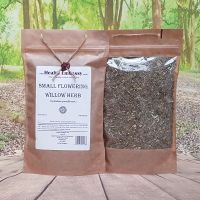Small Flowered Willow Herb
From Wikiwel
(Redirected from Epilobium Parviflorum)
Other Name : Epilobium parviflorum, hoary willowherb, smallflower hairy willowherb, Kleinblütiges Weidenröschen, l'épilobe à petites fleurs, épilobe-mollet, Viltige basterdwederik, Luddunört, بید علفی پونهای, 小花柳叶菜
Small-flowered willow herb, Epilobium parviflorum SCHREBER [Fam. Onagraceae], is widespread in Central and Eastern Europe and in disturbed areas of North America.
Special Precautions of Small Flowered Willow Herb
Benefits and uses of Small Flowered Willow Herb are
- Prostatitis : All willow herb species contain flavorglycosides, especially derivatives of kaempferol, quercetin, and myricetin. Epilobium parviflorum also contains b-sitosterol, various esters of sitosterol, and sitosterol glucoside have been detected. These are the compounds considered to be the active ingredients of Saw Palmetto, another major herb used for treating the prostate.
- Benign prostatic hyperplasia : A special elagitannin, oenothein B, is present in the plant and appears to be an active anti-inflammatory component. The reported anti-cancer activity of willowherb extract may be related to the content of oenothein B, which has been found to exhibit potent anti-tumor properties, as well as cause inhibition of the 5-alpha-reductase enzyme. This explains the antihyperandrogenic effects that may be useful in the prevention and treatment of BPH, as well it supports the use of the extract in the prevention and treatment of prostate cancer.
- Male Conditions:complaints which often occur after a prostate gland operation, including burning sensation on urination,disorders of the prostate gland combined with Saw Palmetto Berries,hypertrophy of the prostate gland.
- Prostate Cancer : Gallic-acid derivatives are also present. Gallic acid and ellagitannins are considered to be the actives associated with the drinking of green tea. Two of these macrocyclic ellagitannins, oenothein A and oenothein B, have been identified as the main constituents responsible for the inhibition of 5-alpha-reductase and aromatese enzymes. These enzymes are considered to play key roles in the cancer of the prostate. Preliminary (in vitro) studies at the Prostate Center of Vancouver found that very low concentrations of an extract from small-flowered willow herb tea, in the micrograms per ml level, was among the most active ever seen against abnormal cells and growths of the prostate. Several extracts from Epilobium parviflorum, were evaluated in biochemical assays with 5-alpha-reductase and aromatase, two enzymes involved in the etiology of benign prostatic hyperplasia (BPH). Aqueous extracts displayed inhibition of these enzymes and the active compounds identified were macrocyclic ellagitannins, oenothein A1, B1 and B2, which can make up to 14% of crude plant extracts. Out of a total of 92 plant phenolic extracts tested, small-flowered willow herb was also found to have high antioxidant activity.
- urinary tract infections in women : In one study, both the large-flowered willow herb (Epilobium angustifolium) and small-flowered willow herb E. parviflorum were found to reduce inflammatory prostaglandins in the carrageenin-induced rat paw edema test; in this study, E. angustifolia was found to be 5 times more powerful than E. parviflori. Antimicrobial screening of 13 phenolic substances and 29 extracts prepared from Finnish plant materials against selected microbes found that small flower willow herb (Epilobium angustifolium L.) was one of the most active plant extracts tested against bacteria.

